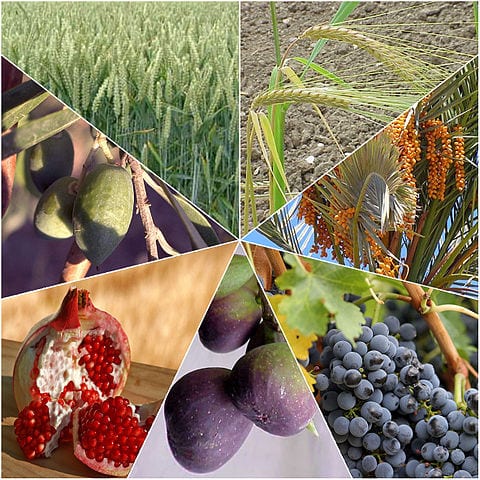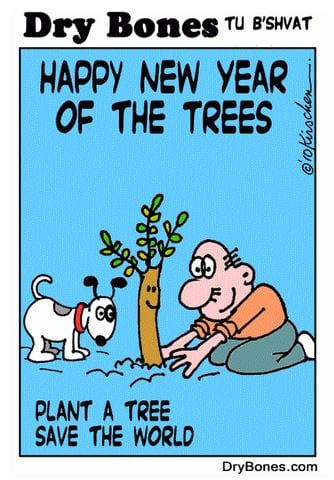According to Jewish tradition, there are four “new years” in the calendar: the new year for the world, the new year for kings, the new year for animals and the new year for trees. The date of the latter is disputed in rabbinic writings, but the final conclusion puts it on the fifteenth day of the Hebrew month of Shvat, landing on January 16 this year. It is the date that marks the beginning of the agricultural tax year; from this point forward, produce grown is considered part of the following year’s crop. This has implications for a variety of agricultural laws including the separation of tithes and the age of trees.

This minor holiday (it has no binding laws or observances) was mostly unsung until the 16th century, when kabbalists in the northern Israeli city of Safed instituted the tradition of a Seder Tu B’Shvat, a ritual meal modelled after the Passover meal, in which the Jewish connection to God and the Land of Israel is celebrated by eating a variety of produce. It features the seven traditional species of the Land of Israel (wheat, barley, grapes, figs, pomegranates, olives and dates), as well as other symbolic fruits.
In 1892, writer, researcher and historian Zeev Yavetz, principal of the Zichron Yaakov school, took his students to plant trees on Tu B’Shvat, and a new tradition was born. According to its website, the Jewish National Fund (KKL-JNF), along with the Teachers’ Union, “formalized the custom in 1908, and provided it with an extra educational dimension.” Worldwide, Jewish children today associate Tu B’Shvat with two things, mainly: eating dried fruit (once the only kind of Israeli fruit available in the diaspora) and sending money to Israel to plant new trees. Thanks to this active tradition, Israel is one of the only countries in the world which ended the last century with more trees than it started, an impressive feat considering they were all hand-planted.
But tree-planting was only the beginning of the modern story of Tu B’Shvat, as the “Jewish Arbor Day” gained an environmental focus. Today, Tu B’Shvat is a time when many reflect on humanity’s stewardship of the earth and evaluate how we are doing. Israel’s contribution is impressive and ever-improving. When God placed man in the Garden of Eden, He instructed him to “work the land and keep it” (Genesis 2:15). Here are some recent Israeli efforts and innovations in the environmental field.
When God placed man in the Garden of Eden, He instructed him to “work the land and keep it” (Genesis 2:15). Here are some recent Israeli efforts and innovations in the environmental field.
Israel’s Knesset started off the civil new year (2014) with its Green Knesset project: a series of measures designed to reduce the government’s carbon footprint and aims to teach everyone who works in and around the parliament building to act in a manner that is ecologically, economically and socially sustainable. It includes 13 specific projects to be implemented over the next two years, such as constructing a 4,500 square meter solar field to power the building and replacing all lightbulbs with energy-efficient LED lights. At an initial investment of NIS 7 million ($2 million US), the project is expected to save roughly NIS 1.5 million ($290,000 US) annually beginning in its fifth year.
The national government is not alone in its green efforts, either. In March, the northern city of Ma’alot implemented its own energy-saving program and changed its lightbulbs. Anticipated savings are NIS 2.4 million a year ($640,000) in energy costs.
 In August, a team of students from four leading Israeli academic institutions participated in the Solar Decathalon in China, building a solar house. The took multiple awards in the competition for their project, including second place for architectural design. In the awards ceremony, the jury described the house as follows: “The innovative and striking shape of this house is a clear expression of the function of its environmental control systems and effective use of resources. Nothing is unnecessary. Everything in this house has a purpose.”
In August, a team of students from four leading Israeli academic institutions participated in the Solar Decathalon in China, building a solar house. The took multiple awards in the competition for their project, including second place for architectural design. In the awards ceremony, the jury described the house as follows: “The innovative and striking shape of this house is a clear expression of the function of its environmental control systems and effective use of resources. Nothing is unnecessary. Everything in this house has a purpose.”
In March, RuBind, an Israeli paving compound made from recycled tires, began being used to pave a new highway in the Beit Shean region. The compound keeps the tires out of landfills and has the added benefit of reducing noise pollution on the roads. Already in use in pilot-roads paved in Italy and Russia, with contracts approved in the United States, China and Brazil, this is the first time the compound is being used in its own home country. Ynetnews.com reported earlier this year that according to Ronen Peled, CEO of Silica Industries, which makes RuBind, the company is currently waiting for the green-light from the Israel National Roads Company. Once that is given, the compound would be used in roads nationwide.
This is only the tip of the iceberg. From water desalination to halting desertification, Israel is at the forefront of environmental progress.



